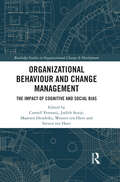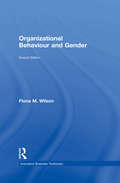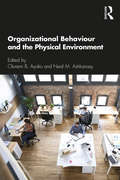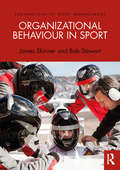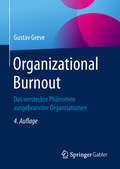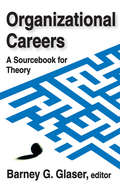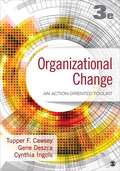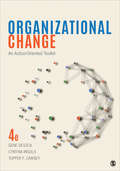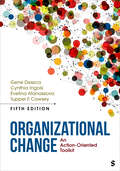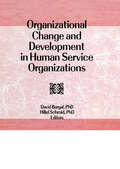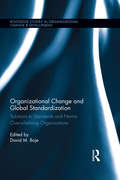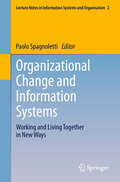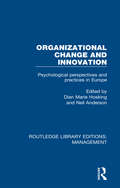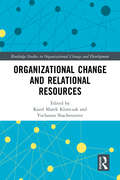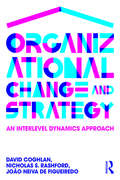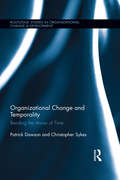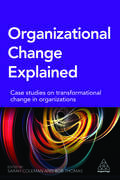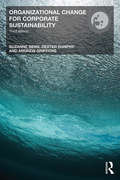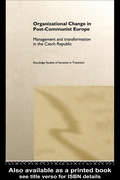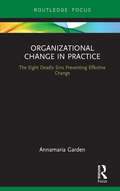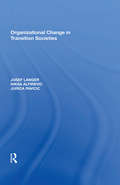- Table View
- List View
Organizational Behaviour and Change Management: The Impact of Cognitive and Social Bias (Routledge Studies in Organizational Change & Development)
by Steven ten Have Wouter ten Have Cornell Vernooij Judith Stuijt Maarten HendriksPeople are social animals and change is a social process. To understand this social process and explain the thoughts, feelings and behaviours of individuals, knowledge of how people are influenced by the presence of others is crucial. In this regard, bias, is a concept with a lot of potential. Cognitive and social biases, by influencing human thinking, feelings, and behaviour, provide insights and knowledge that are helpful, if not essential for the field of organisational behaviour and change management. The statements stated above may seem obvious and self-evident, but practice as well as science, show that it is not. Organizational Behaviour and Change Management: The Impact of Cognitive and Social Bias aims at unleashing the potential of cognitive and social biases to develop a more effective change management theory and practice. To do so thousands of scientific articles were analysed and assessed. The most prominent biases are structured by using a practical and comprehensible framework based on five core social motives (belonging, understanding, controlling, trusting and self-enhancing). With its evidence-based, systematic and integrative approach, this book provides scientists and practitioners in the field of organisational behaviour and change management with the best available evidence, linking biases to organisational behaviour and change and thereby further enriching the field of change management.
Organizational Behaviour and Gender
by Fiona M. WilsonOrganizational Behaviour and Gender provides an alternative to the gender silence of the standard OB textbooks. This Second Edition updates and expands the text's coverage and employs the most recent research findings to portray the world of work in a realistic manner. Organizational Behaviour and Gender is a comprehensive text. The text examines some of the assumptions that have been made about women at work - for example that women's 'difference' is rooted in biology and that women and men have contrasting (and even polar opposite) skills and attitudes. The text considers the key topics in OB (such as selection, assessment,leadership and motivation) to test such assumptions. The book describes the reality of working life for women. It examines issues of low pay, part-time working, family responsibilities, home working and horizontal and vertical job segregation. It asks whether inequality of opportunity comes about because of actual gender differences or from prejudicial expectations and thinking. The last chapter is about sex and sexuality in organizations. Sexual behaviour in organizations is pervasive but is rarely discussed in OB textbooks. This chapter describes the masculine and heterosexual business environment and examines the issues of work romances and sexual harassment. The text provides numerous learning aids (including discussion topics and chapter questions) to assist both the lecturer and the student.
Organizational Behaviour and the Physical Environment
by Oluremi B. Ayoko Neal M. AshkanasyThis book looks at how the physical environment of work shapes organizational behaviour, demonstrating that our physical surroundings at work can have a big influence on employee productivity, performance and wellbeing. Drawing upon the latest research, Organizational Behaviour and the Physical Environment provides comprehensive coverage of the different aspects of the physical environment at work – the buildings, furnishings, equipment, lighting, air quality and their configurations. From theories of psychological ownership and work design, to cultural issues and technology in the workplace, its international range of contributors provide voices from Australasia, North America, Europe and the Middle East. This book will be invaluable supplementary reading for advanced students, researchers and practitioners across the fields of organizational behaviour, HRM, organizational and environmental psychology, and workspace design.
Organizational Behaviour in Sport (Foundations of Sport Management)
by Bob Stewart James SkinnerWhat makes a sport enterprise successful? How can managers working in sport improve organizational effectiveness through strategic behaviour management? This comprehensive and accessible textbook addresses these important questions and examines the theories that underpin organizational analysis in sport. Helping both students and practitioners to understand the different types of behaviour that occur within a sports enterprise, it also demonstrates how to develop ways of managing behaviour more effectively for the benefit of all stakeholders. The book explores behaviour on individual, interpersonal, group and whole-organization levels, and presents an evidence-based framework for analysis built around key concepts such as: Change and culture Leadership Motivation, rewards and incentives Power and influence Conflict, disputes and grievances Equity, diversity and inclusion. With international case studies, learning objectives, review questions and guides to further reading included in every chapter, no other textbook develops critical skills or an awareness of ethical issues in such detail and depth. Organizational Behaviour in Sport is essential reading for all students and practitioners working in sport, leisure or recreation management.
Organizational Burnout: Das versteckte Phänomen ausgebrannter Organisationen
by Gustav GreveErfahren Sie in diesem Buch alles rund um das Thema Managementfehler und Organizational BurnoutBleiben bei einer gut aufgestellten Unternehmensorganisation die bisherigen Erfolge aus, dann ist oft ein sogenannter Organizational Burnout (OBO) die Ursache dafür. Gustav Greve beschreibt das weit verbreitete Phänomen in diesem Buch eindrücklich und anschaulich. Seit 2010 sind 143.4751 Unternehmen in die Insolvenz gegangen - davon mindestens die Hälfte wegen Managementfehlern. Viele ausgebrannte Organisationen könnten heute noch dabei sein, wenn sie sich diesem aktuellen Phänomen souverän gestellt hätten. Aus diesem Grund schildert der Autor in seinem Buch die typischen Gründe, Symptome und Folgen des Organizational Burnout sowie eine wirksame Therapie. Er erklärt die Erfolgsdefizite der betroffenen Unternehmen und zeigt damit einen Weg aus der Krise auf. Ein sehr praxisorientiertes Fachbuch für Unternehmer, Führungskräfte und BeraterGreves Werk „Organizational Burnout“ ist ein Buch aus der Praxis für die Praxis. Es richtet sich an:EigentümerUnternehmerFührungskräfteMitarbeiter BeraterDas Werk basiert in erster Linie auf Greves Erfahrungen als Unternehmer, CEO und Unternehmensberater. Dem Autor ist es damit gelungen, ein leicht lesbares Buch über Organizational Burnout mit Tiefgang und umfassenden Begründungen zu schreiben, das nie belehrend, aber zugleich doch lehrreich ist. Greve möchte damit zeigen, wie Unternehmen den Paradigmenwechsel schaffen und neue Energie für einen organisationsmentalen Turnaround finden. Für die 4. Auflage wurde das Buch vollständig durchgesehen und aktualisiert.
Organizational Careers: A Sourcebook for Theory
by Barney GlaserAlthough sociologists have written extensively on the broad subject of occupational careers, generally they have referred only incidentally to organizational careers within work organizations. In this pioneering sourcebook, now considered a classic, Glaser gathered from the literature of occupational sociology those studies that bear most directly on organizational careers. His objective was to provide the first survey of the substantial body of data on the subject and to place this data in a framework that illustrates its significance for the development of theory. In an extensive introduction, the editor explains the several purposes of the book and describes in detail the process of comparative analysis through which sociological theory on organizational careers can be generated. Organized around general themes such as recruitment, motivation, commitment, mobility, and succession, the writings of prominent sociologists--including Riesman, Caplow, Hughes, Becker, and Wilensky--form the content of the book and systematically cover every important facet of organizational careers. The editor's introductions to each section of the book alert the reader to the general phenomena--such as processes, conditions, categories, hypotheses, and properties--that crosscut and are generally relevant to all organizational careers and are, therefore, the raw material of theory. These introductions also suggest questions and problems for further analysis and research. This book as a whole stands as a demonstration of the contributors' method of how the sociologist, working from the data of research, can generate grounded, formal theory on this or any social phenomenon. This book also presents a vital body of data on organizational careers and a guide to further research that will be of great use both to occupational sociologists and to all those involved in the study of organizations.
Organizational Change: An Action-Oriented Toolkit
by Tupper F. Cawsey Gene Deszca Cynthia A. IngolsAwaken, mobilize, accelerate, and institutionalize change. With a rapidly changing environment, aggressive competition, and ever-increasing customer demands, organizations must understand how to effectively adapt to challenges and find opportunities to successfully implement change. Bridging current theory with practical applications, Organizational Change: An Action-Oriented Toolkit, Third Edition combines conceptual models with concrete examples and useful exercises to dramatically improve the knowledge, skills, and abilities of students in creating effective change. Students will learn to identify needs, communicate a powerful vision, and engage others in the process. This unique toolkit by Tupper Cawsey, Gene Deszca, and Cynthia Ingols will provide readers with practical insights and tools to implement, measure, and monitor sustainable change initiatives to guide organizations to desired outcomes.
Organizational Change: An Action-Oriented Toolkit
by Tupper F. Cawsey Gene Deszca Cynthia A. IngolsAwaken, mobilize, accelerate, and institutionalize change. With a rapidly changing environment, aggressive competition, and ever-increasing customer demands, organizations must understand how to effectively adapt to challenges and find opportunities to successfully implement change. Bridging current theory with practical applications, Organizational Change: An Action-Oriented Toolkit, Third Edition combines conceptual models with concrete examples and useful exercises to dramatically improve the knowledge, skills, and abilities of students in creating effective change. Students will learn to identify needs, communicate a powerful vision, and engage others in the process. This unique toolkit by Tupper Cawsey, Gene Deszca, and Cynthia Ingols will provide readers with practical insights and tools to implement, measure, and monitor sustainable change initiatives to guide organizations to desired outcomes.
Organizational Change: An Action-Oriented Toolkit
by Tupper F. Cawsey Gene Deszca Cynthia A. IngolsShow managers of all stripes how to be key change leaders. In today’s world, organizational resilience, adaptability and agility gain new prominence. Awaken, mobilize, accelerate, and institutionalize change with Organizational Change: An Action-Oriented Toolkit. Bridging theory with practice, this new edition uses models, examples, and exercises to help students engage others in the change process. Authors Gene Deszca, Cynthia Ingols, and Tupper F. Cawsey provide tools for implementing, measuring, and monitoring sustainable change initiatives and helping organizations achieve their objectives. The Fourth Edition includes new critical thinking exercises, cases, checklists, and examples as well as updated coverage of key topics such as social media, power dynamics, decision testing, storytelling, and control systems.
Organizational Change: An Action-Oriented Toolkit
by Tupper F. Cawsey Gene Deszca Cynthia A. IngolsShow managers of all stripes how to be key change leaders. In today’s world, organizational resilience, adaptability and agility gain new prominence. Awaken, mobilize, accelerate, and institutionalize change with Organizational Change: An Action-Oriented Toolkit. Bridging theory with practice, this new edition uses models, examples, and exercises to help students engage others in the change process. Authors Gene Deszca, Cynthia Ingols, and Tupper F. Cawsey provide tools for implementing, measuring, and monitoring sustainable change initiatives and helping organizations achieve their objectives. The Fourth Edition includes new critical thinking exercises, cases, checklists, and examples as well as updated coverage of key topics such as social media, power dynamics, decision testing, storytelling, and control systems.
Organizational Change: An Action-Oriented Toolkit
by Gene Deszca Cynthia A. Ingols Evelina Atanassova Tupper F. CawseyIn today’s world, organizational resilience, adaptability and agility gain new prominence. Awaken, mobilize, accelerate, and institutionalize change with Organizational Change: An Action-Oriented Toolkit, Fifth Edition. Bridging theory with practice, this new edition uses models, examples, and exercises to help students engage others in the change process. Authors Gene Deszca, Cynthia Ingols, Tupper F. Cawsey, and Evelina Atanassova provide tools for implementing, measuring, and monitoring sustainable change initiatives and helping organizations achieve their objectives.
Organizational Change: An Action-Oriented Toolkit
by Gene Deszca Cynthia A. Ingols Evelina Atanassova Tupper F. CawseyIn today’s world, organizational resilience, adaptability and agility gain new prominence. Awaken, mobilize, accelerate, and institutionalize change with Organizational Change: An Action-Oriented Toolkit, Fifth Edition. Bridging theory with practice, this new edition uses models, examples, and exercises to help students engage others in the change process. Authors Gene Deszca, Cynthia Ingols, Tupper F. Cawsey, and Evelina Atanassova provide tools for implementing, measuring, and monitoring sustainable change initiatives and helping organizations achieve their objectives.
Organizational Change and Development in Human Service Organizations
by David Bargal Hillel SchmidThrough change and development, human service organizations can promote the well-being of their clients more effectively. This important book describes and analyzes recent research on organizational change and development in the social and human services. It is particularly relevant in light of the significant changes in these organizations during the last decade and the lack of literature in the area. Organizational Change and Development in Human Service Organizations brings together the work of scholars who deal with social welfare administration and change in human services, combining research studies with theoretical approaches to change and development. It helps readers better understand the process of change and the role of the environment in creating change. Insightful chapters encourage practitioners, scholars, and students to plan change in organizations, utilize models of change and organizational development in real life, and evaluate change and its results and impacts. This much-needed book addresses a variety of topics, including: the uses of force field analysis in assessing prospects for organizational change planned change in voluntary and government social service agencies interorganizational coordination of services to children in state custody early stages in the creation of self-help organizations organization and community transformation organizational development in public social services strategic and structural change in human service organizations a developmental approach to program evaluationMany readers will find the information in Organizational Change and Development in Human Service Organizations to be extremely beneficial in their daily work. Covering the important issues, it gives readers a deeper insight into the processes of change and development so they can provide better services to their clients. This book is a vital resource for social workers, professionals in public administration, individuals involved in MSW programs, and students in the social sciences, including sociology and political science.
Organizational Change and Global Standardization: Solutions to Standards and Norms Overwhelming Organizations (Routledge Studies in Organizational Change & Development)
by David M. BojeOrganizational Change and Global Standardization: Solutions to Standards and Norms Overwhelming Organizations takes an organizational change approach to the overflow of standards and norms, looking at how to deal effectively and ethically with four kinds of standards and norms businesses face when they go global: (1) accounting & finance (2) international & world trade,(3) social and (4) safety & quality & environment. It is part of a larger problem faced by not only business, but every sort of organization - how to live with the epidemic of standards and norms, often in conflict, many just unnecessary, and a few that are quite helpful and important. There are good reasons to have International Standards Organization (ISO), International Labor Organization (ILO), World Trade Organization (WTO), North Atlantic Treaty Association (NAFTA), International accounting Standards Boards (IASB), International Financial Reporting Standards (IFRS)), and many more standard-setting organizations issuing, auditing, proposing codes of ethics, and certifying standards and norms. However, there are important, poorly understood organizational change consequences to the contagion of standards and norms. This volume brings together a unique group of authors who are working on a pragmatic way for organizations to deal with an overflow of standards and norms that are often at heads, ambiguous, or simply created to produce more work for a burgeoning standards setting industry. The aim of Organizational Change and Global Standardization is to stimulate a critical analysis within the framework of analytical and pragmatic approach to an overwhelming bureaucratization of the managed and organized global activities.
Organizational Change and Information Systems: Working and Living Together in New Ways
by Paolo SpagnolettiThis book examines a range of issues emerging from the interaction of Information Technologies and organizational systems. It contains a collection of research papers focusing on themes of growing interest in the field of Information Systems, Organization Studies, and Management. The book offers a multidisciplinary view on Information Systems aiming to disseminate academic knowledge. It might be particularly relevant to IT practitioners such as information systems managers, business managers and IT consultants. The volume is divided into six sections, each one focusing on a specific theme. The content of each section is based on a selection of the best papers (original double blind peer reviewed contributions) presented at the annual conference of the Italian chapter of AIS, which has been held in Rome, Italy in September 2012.
Organizational Change and Innovation: Psychological Perspectives and Practices in Europe (Routledge Library Editions: Management)
by Dian Marie Hosking Neil AndersonFirst published in 1992. Organisational change and innovation has been at the centre of much management literature, which has been informed by debates in organizational behaviour and strategic management. The psychology of how people in organizations adapt to and manage change is key to our understanding of the processes by which such changes can occur successfully. Organizational Change and Innovation brings together the recent research findings of leading European work and organization psychologists, who take stock of existing theories about organizational change in the light of new case material. Their findings, from a range of cultural and national contexts, challenge some previously accepted models and set a new agenda for future research. In particular, the volume provides new perspectives on the person organization relationship; the political qualities of organizational change; the input-output model of organizations as entities; and finally on research methodology.
Organizational Change and Relational Resources (Routledge Studies in Organizational Change & Development)
by Karol Marek KlimczakTransitioning organizations to the new normal following environmental shocks, economic upheavals and technological innovations is a challenge to classic organizational management, because no single organization knows with precision what the target of change is. Resources created and operated in relationships can support the organization in overcoming its constraints, changing faster, and adapting better. This book takes a relational perspective on how organizations adjust and adapt to their turbulent environment. Drawing from a broad literature and empirical studies, this book offers novel insights into how businesses create, grow, and manage relationships with partners to support strategic change. It discusses the benefits of cooperating with partners and relying on shared resources, while controlling relational risks. It presents key relational processes including organizational intelligence, open culture, knowledge sharing routines, motivation, co-creation, and communication. It discusses focus areas: longevity of family firms, improving health and safety in medical services, crisis management, public administration reforms, and relational risk management. This book is a valuable resource for researchers and students in the fields of organizational studies, organizational change, technology, and innovation management. Managers and entrepreneurs can find inspiration, motivation, and strategies for implementing and managing relationships along the value chain.
Organizational Change and Strategy: An Interlevel Dynamics Approach
by David Coghlan Nicholas S. Rashford João Neiva de FigueiredoOrganizations change, usually driven by strategies, yet strategic management and organizational change are generally understood as separate domains in the business world. This book integrates the behavioural dynamics of learning, change and strategy at and across individual, team, interdepartmental, group and organizational levels. This new edition emphasizes what can be done in organizations to enable strategy to be effective and to help organizations to change and learn. Central to the book is a reflexive engagement approach through inviting the readers to apply concepts to their own organizational situations and via reflective exercises. The authors also offer cases from a wide range of organizations, from universities to steel and digital businesses. This practical book addresses managers, consultants, students and researchers and provides specific orientation to assist each readership group to learn from its own perspective.
Organizational Change and Temporality: Bending the Arrow of Time (Routledge Studies in Organizational Change & Development)
by Patrick Dawson Christopher SykesOrganizational Change and Temporality: Bending the Arrow of Time looks to address the important area of time and temporality, especially as it relates to frameworks and studies for explaining change processes in organizations. It commences with a selective history on the science and philosophy of time before examining the place of time in work and employment, and the presence and absence of theorized time in explanations of organizational change. The intention is to bring to the fore concepts and debates that have largely remained hidden, furthering our knowledge and understanding of time and temporality in changing organizations. The authors provide a more informed theoretical explanation of the temporal dimensions of organizational change. They examine the concepts and debates behind change theories, philosophical positions and scientific concerns on time and material existence, drawing connections that have previously remained unexplored. This book is key reading for researchers within the organizational change world and will further the academic debate of time and temporality in organizations studies.
Organizational Change Explained: Case Studies on Transformational Change in Organizations
by Bob Thomas Sarah ColemanThe best way to learn how to navigate change successfully is to look at practical examples of change management programmes. Organizational Change Explained shares stories and insights from experienced change practitioners so professionals can reflect on their own work, respond critically to what others have done, and take away new tools and techniques to apply to their own change management practice. The book includes a range of cases from different sectors and countries including GlaxoSmithKline and the NHS to offer insights no matter the scale of the change management programme. Organized around central themes such as shaping and design, change leadership, and communication and engagement, Organizational Change Explained presents each case alongside an introduction, conclusion, list of key learning points, questions for reflection and sources of further reading. The book is invaluable to anyone tasked with leading or managing change within their teams, projects, departments or divisions, whether at local level or across geographic locations, countries and cultures.
Organizational Change for Corporate Sustainability
by Suzanne Benn Dexter Dunphy Andrew GriffithsSince this classic book was first published in 2003, sustainability has increasingly become mainstream business for leading corporations, whilst the topic itself has also been a hotly debated political issue across the globe. The sustainability phase models originally discussed in the book have become more relevant with ever more examples of organizations at later stages in the development of corporate sustainability. Bringing together global issues of ecological sustainability, strategic human resource management, organizational change, corporate social responsibility, leadership and community renewal, this new edition of the book further develops its unified approach to corporate sustainability and its plan of action to bring about corporate change. It integrates new research and brings illustrative case studies up to date to reflect how new approaches affect change and leadership. For the first time, a new positive model of a future sustainable world is included - strengthened by references to the global financial crisis, burgeoning world population numbers and the rise of China. With new case studies including BP's Gulf oil spill and Tokyo Electric Company's nuclear reactor disaster, this new edition will again be core reading for students and researchers of sustainability and business, organizational change and corporate social responsibility.
Organizational Change for Corporate Sustainability: A Guide For Leaders And Change Agents Of The Future (Understanding Organizational Change Ser.)
by Tim Williams Suzanne Benn Melissa EdwardsSince this classic book was first published in 2003, sustainability has increasingly been accepted as standard business practice for leading corporations, while the science itself has revealed how human activity has become the dominant force influencing irreversible changes in the planetary systems. The fourth edition of this trailblazing book on corporate sustainability provides new insights into how organizations can transition towards a more responsible way of conducting their business. It charts new thinking on value creation, business models and organizational purpose as the basis of a broader-based transition to a sustainable society. The sustainability phase model has been substantially revised to incorporate emergent approaches in sustainable supply chain management, strategic sustainability, sustainability-oriented innovation and new business models. There is a companion website that contains a range of materials to support learning. This new edition with the authors’ unified approach to sustainable business reshapes its plan of action to bring about corporate change by drawing in new management theory and practice on strategy-making and leadership, making it core reading for students and researchers of sustainability and business, organizational change and corporate social responsibility.
Organizational Change in Post-Communist Europe: Management and Transformation in the Czech Republic (Routledge Studies of Societies in Transition)
by Ed Clark Anna SoulsbyThis book provides a unique and detailed examination of the complex processes of transformation in former state-owned enterprises in the Czech Republic. Drawing on in-depth case studies of organizational transformation, the authors adopt a social-institutionalist approach to the study of organizational change, applying it in order to develop an explanation of organizational restructuring and management redefinition during the early transition period of 1990-1996. In particular, they highlight how these processes have been shaped by continuing historical state-socialist legacies and the powerful role played by senior managers in their efforts to fashion the new privatized organizations in their own interests.
Organizational Change in Practice: The Eight Deadly Sins Preventing Effective Change
by Annamaria GardenThis book challenges the practice or organizational change programmes. It uses two case studies in depth to illustrate that consulting companies can often get it wrong. Senior managers often do not know enough about managing change. The text is arranged around eight deadly sins to avoid in the practice of change: self-deception of the change agents rather than self-awareness; destruction of the identity of the organization caused by arrogance; especially of the large consulting companies; destruction of cohesion; gobbledygook language; concentrating on structural change, not behavioural change; making the organization worse, not better; the intelligence in resistance; and the deep trauma of redundancy. The author's main objective is to get academics and practitioners to stop and think about what they are doing when they work with organizations. Organizational Change in Practice will be of interest to business professionals seeking to understand how change can impact their organization as well as organizational consultants.
Organizational Change in Transition Societies (Transition And Development Ser.)
by Josef Langer Niksa Alfirevic J PavicicThis book discusses change management paradigms with special reference to examples and cases from the transition societies in Central and Eastern Europe (CEE). The first chapter analyses developments and trends in the wider societal context of Central and Eastern Europe. Theoretical perspectives are applied to understand the processes of transition and EU accession in Central and Eastern Europe. Following the second and third chapters, the most frequently used tools and procedures of change management are analysed from the perspective of a CEE organization. The special advantage of the text to the potential readership is the integration of 'macro' (societal) and 'micro' (organizational) points of view towards understanding change. The text also provides real-life examples and perspectives of understanding and managing change from Central and Eastern Europe, which helps the reader to grasp the wider political, economic and societal context(s) of the CEE region.
